Additional Information
Book Details
Abstract
France's response to the rise of European fascism during the 1930s, and subsequently to the Nazi occupation 1940-44, has been a difficult subject for the nation’s historians. The consensus amongst leading French authorities on the period has been the claim that France was largely 'immune' to fascism in the 1930s, and that the Vichy regime was an aberration produced by defeat and occupation. Over the last 30 years, this position has gradually been undermined, mainly through the work of foreign scholars, but it nonetheless remains intact. This volume brings together for the first time the leading critics of the standard French interpretation, who have used these essays to refine and update their positions, or to move the debate onto new terrain.
“With its lucid introduction and conclusion, clear translations oftexts first published in French, and useful notes on the contributors, this collection will undoubtedly be of considerable use not only to specialists, but also in advanced undergraduate and graduate classrooms.” · European History Quarterly
“Overall, this is a gracefully written, groundbreaking study sure to spark lively debate in the years to come. Even though the individual contributors’ approaches are often directly critical of one another, the essays are logically and coherently linked. Readers will appreciate the genuinely comparative perspective, which the authors have brought to bear on France’s role in a wider European drama.” · French Review
“The book provides a useful antidote to contemporary versions of the stalemate society thesis found in analyses which separate ‘national-populism’ from ‘generic’ inter-war fascism, identifying it as a familiar response to crisis in France and implicitly reviving the myth of France’s ‘allergy’ to fascism. The fluid analytical perspectives outlined here, in particular by Paxton and Dobry, present a nuanced counterpoint to the teleology of historical analyses shaped more by outcomes than the indeterminacy of messy reality.” · E-Extreme
“An important collection...the authors adopt different methodologies and viewpoints, disagreements that thankfully do not degenerate into semantics, thanks to tight editorial control. It is these ongoing debates which lend freshness and colour to this volume.” · Journal of Contemporary European Studies
Brian Jenkins is Research Professor in the Department of French at the University of Leeds. His doctoral thesis was on the Paris riots of February 6th 1934, and he has recently returned to the study of the French extreme Right between the world wars. He has also written extensively on French nationalism, and on theories of nationalism, notably as the author of Nationalism in France: Class and Nation since 1789 (1990) and as co-editor of Nation and Identity in Contemporary Europe (1996). He is co-editor of the Journal of Contemporary European Studies.
Table of Contents
| Section Title | Page | Action | Price |
|---|---|---|---|
| France in the Era of Fascism | 1 | ||
| Contents | 5 | ||
| Preface | 6 | ||
| 1. Introduction: Contextualising the Immunity Thesis | 9 | ||
| 2. Morphology of Fascism in France | 30 | ||
| 3. Fascism in France: Problematising the Immunity Thesis | 73 | ||
| 4. The Five Stages of Fascism | 113 | ||
| 5. February 1934 and the Discovery of French Society’s Allergy to the ‘Fascist Revolution’ | 137 | ||
| 6. The Construction of Crisis in Interwar France | 159 | ||
| 7. Conclusion: Beyond the ‘Fascism Debate’ | 208 | ||
| Select Bibliography | 227 | ||
| Index | 235 |
